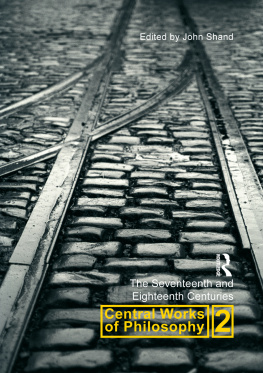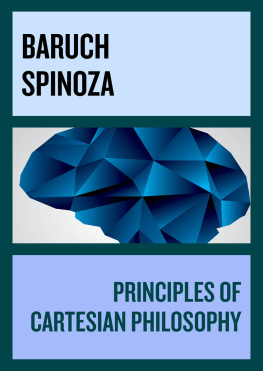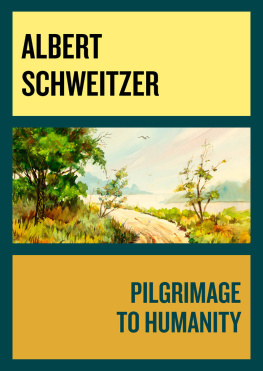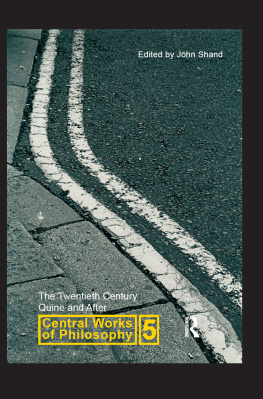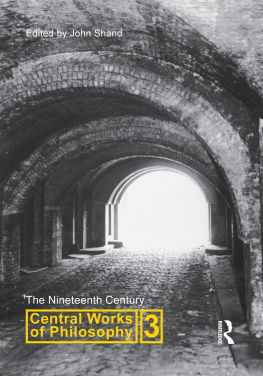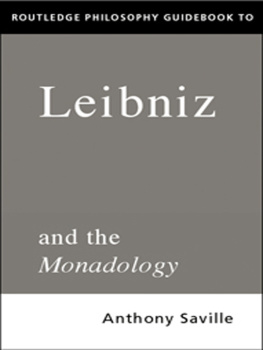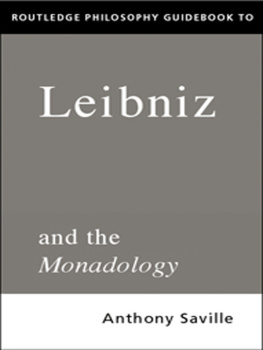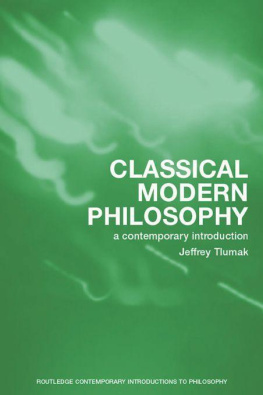Central Works of Philosophy
Central Works of Philosophy is a multi-volume set of essays on the core texts of the Western philosophical tradition. From Plato's Republic to the present day, the volumes range over 2,500 years of philosophical writing covering the best, most representative, and most influential work of some of our greatest philosophers. Each essay has been specially commissioned and provides an overview of the work and clear and authoritative exposition of its central ideas. Together these essays introduce the masterpieces of the Western philosophical canon and provide an unrivalled companion for reading and studying philosophy.
Central Works of Philosophy
Edited by John Shand
Volume 1: Ancient and Medieval
Volume 2: The Seventeenth and Eighteenth Centuries
Volume 3: The Nineteenth Century
Volume 4: The Twentieth Century: Moore to Popper
Volume 5: The Twentieth Century: Quine and After
Central Works of Philosophy Volume 2
The Seventeenth and Eighteenth Centuries
Edited by John Shand
In memory of my parents, Alexander Hesketh Shand and Muriel Olive Shand
First published in 2005 by Acumen
Published 2014 by Routledge
2 Park Square, Milton Park, Abingdon, Oxon OX14 4RN
711 Third Avenue, New York, NY 10017, USA
Routledge is an imprint of the Taylor & Francis Group, an informa business
Editorial matter and selection, 2005 John Shand. Individual contributions, the contributors.
This book is copyright under the Berne Convention.
No reproduction without permission.
All rights reserved. No part of this book may be reprinted or reproduced or utilised in any form or by any electronic, mechanical, or other means, now known or hereafter invented, including photocopying and recording, or in any information storage or retrieval system, without permission in writing from the publishers.
Notices
Practitioners and researchers must always rely on their own experience and knowledge in evaluating and using any information, methods, compounds, or experiments described herein. In using such information or methods they should be mindful of their own safety and the safety of others, including parties for whom they have a professional responsibility.
To the fullest extent of the law, neither the Publisher nor the authors, contributors, or editors, assume any liability for any injury and/or damage to persons or property as a matter of products liability, negligence or otherwise, or from any use or operation of any methods, products, instructions, or ideas contained in the material herein.
ISBN 13: 978-1-84465-014-9 (hbk)
ISBN 13: 978-1-84465-015-6 (pbk)
British Library Cataloguing-in-Publication Data
A catalogue record for this book is available from the British Library.
Designed and typeset in Garamond by Kate Williams, Swansea.
Contents
| John Shand |
| Janet Broughton |
| Steven Nadler |
| Douglas Burnham |
| G. A. J. Rogers |
| J. R. Milton |
| Tom Stoneham |
| P J. E. Kail |
| Jonathan Riley |
Janet Broughton is Professor of Philosophy at the University of California, Berkeley Her main philosophical interests lie in the history of seventeenth- and eighteenth-century philosophy She is the author of Descartes's Method of Doubt.
Douglas Burnham is Senior Lecturer in Philosophy at Staffordshire University He is the author of An Introduction to Kant's Critique of Judgement and Kant's Philosophies of Judgement.
P.J. E. Kail is Lecturer in Philosophy at the University of Edinburgh. He is the author of Projection and Realism in Huyne (forthcoming) and a number of articles in the history of philosophy
J. R. Milton is Senior Lecturer in Philosophy at King's College, London. He has written widely on various aspects of Locke's thought, and has just completed work on an edition of Locke's early writings on religious toleration.
Steven Nadler is Professor of Philosophy at the University of Wisconsin-Madison. Among his recent books are Spinoza: A Life and Spinoza's Heresy.
Jonathan Riley is Professor of Philosophy at Tulane University. His most recent book is Mill's Radical Liberalism.
G. A. J. Rogers is Professor of the History of Philosophy Emeritus at Keele University and, since 1993, the Founder-Editor of the British Journal for the History of Philosophy. His most recent book, with the late Karl Schuhmann, is a critical edition of Hobbes' Leviathan.
John Shand is an Associate Lecturer in Philosophy at the Open University and is the author of Arguing Well and Philosophy and Philosophers: An Introduction to Western Philosophy (Acumen).
Tom Stoneham is Lecturer in Philosophy at the University of York. Prior to that he was a Fellow of Merton College, Oxford, where he still owns the house in Holywell Street where Berkeley died. He is the author of Berkeley's World.
The works in the Central Works of Philosophy volumes have been chosen because of their fundamental importance in the history of philosophy and for the development of human thought. Other works might have been chosen; however, the underlying idea is that if any works should be chosen, then these certainly should be. In the cases where the work is a philosopher's magnum opus the essay on it gives an excellent overview of the philosopher's thought.
by Janet Broughton introduces Descartes's Meditations on First Philosophy , which is usually taken as marking the beginning of modern philosophy Descartes takes an intellectual journey, that is both logically rigorous and psychologically convincing, moving from sceptical subjectivity to establishing that there may be objective and certain knowledge. He also seeks to determine the ultimate nature of reality, and concludes that it can be divided into unextended consciousness or thought, and unthinking extended matter. The overall aim is to set aside the contingent aspects of our perspective on the world and so arrive at an objectively true conception of reality.
appearance of contingency is merely a consequence of our ignorance of causes. Mind and matter are two attributes of this single substance. We are morally responsible and most truly ourselves when we act according to reason, free from immediate external contingent influences, and we act according to reason in so far as our ideas are active and thus adequately reflect the structure of reality.
by Douglas Burnham discusses Leibniz's The Monadology, which condenses and sums up his philosophy He seeks to identify the nature of true substance. Although Leibniz agrees with Spinoza that substance is autonomous and must appeal to nothing outside itself for an explanation of its nature, he does not include the explanation of its existence as part of its essence. Substances - unextended, simple, purely qualitative, and without parts - he calls "monads". God chooses to bring into existence one of an infinite number of possible universes of monads; the explanation for His choosing this universe is that it satisfies the condition of its being the best. Once created the universe unfolds with logical necessity. What we call appearances, or the physical world, are well-founded phenomena that reflect systematic changes in the monads. The guiding idea of Leibniz and Spinoza is to give an account of fundamental reality, if there is to be, as there must, a complete explanation for why it is as it is.

